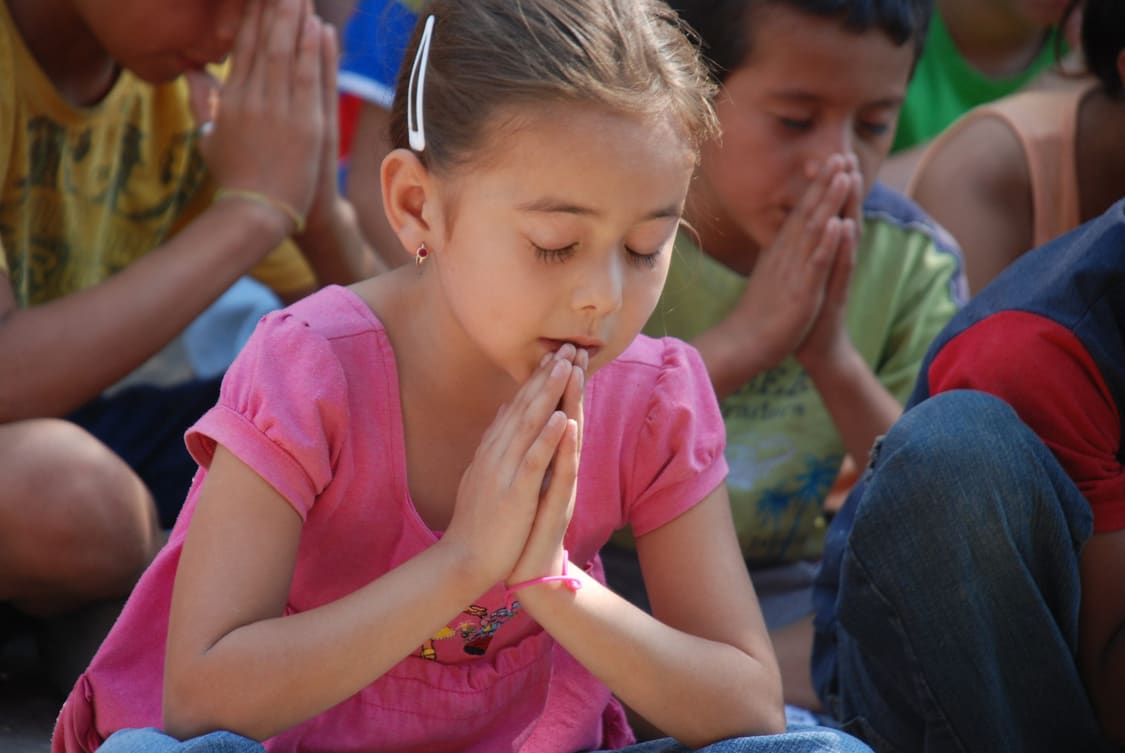Art of Spiritual Parenting – SRF YSS magazine
The following article was published in YSS Magazine in 2010. It was written by an Educational Psychologist, named Patricia Evertz, who has served in SRF YSS Sunday School program for more than 30 years.
In this really useful article, she gives some great tips to parents making it a must read for all parents.
Note: The images have been added to make the post visually appealing.
The Art of Spiritual Parenting – Patricia Evertz
(Jan-Mar 2010, YSS Magazine)

A young woman reminisced, “Growing up in Yogoda Satsanga Society of India/Self-Realization Fellowship, I always felt I had something special. Even as a young child, I believed that God was watching over me and everything would be okay, no matter what happened. When disappointments came, even if I didn’t understand why, I believed it was what God felt I needed at the time. I still feel that way today. I think because of this, I developed a resilience I might not have had otherwise. YSS/SRF principles permeated our family life, and I feel so blessed for that”
How do children develop this kind of personal relationship with God? How can mothers and fathers best encourage their children’s spiritual lives? We interviewed parents who have successfully built their family lives on strong spiritual foundations; and also spoke with young adults who have gone through the YSS/SRF youth programs and are successfully applying Paramahansa Yoganandaji’s how-to-live principles in their everyday lives. The knowledge they shared with us is applicable by any parent.
Set the Example
In one of Aesop’s fables, a mother crab tried to get her baby crab to walk forward, rather than sideways. Try as he might, the little crab could not do it. “Show me how,” he asked his mother. But the mother could not, so both continued to walk sideways.
Like the mother crab, many of us find ourselves wishing from time to time that children would do as we say, not as we do. But that is not how children learn. Children constantly watch their parents and the other adults around them. They imitate what we do, how we think, and how we feel. They pick up our habits. Whether or not we realize it, we constantly teach children by our example.
One parent commented, “Although I tried telling my children stories from Autobiography of a Yogi, and discussing spiritual subjects with my children, I didn’t really see any change until my husband and I started meditating regularly ourselves. Once we established the habit, then I began to see them become interested.”

Give Them Unconditional Love and Companionship
A child’s first tangible experience of love in this life usually comes from the mother and father. Their unconditional love and acceptance help prepare the child for a loving relationship with God. In one of Paramahansa Yoganandaji’s Children’s Prayers he wrote, “Dear God, I know Thou art Love, because my mother and father love me. Thou art my Heavenly Father and my Heavenly Mother.” Yoganandaji taught that when a parent’s love is unselfish and pure, it actually reflects the unconditional love of God.

Along with love, children need the companionship of their parents. As parents play, talk, and spend time with their children, rapport and trust grow. By starting this relationship when children are young, the connection and trust it develops enable children to feel they can come to their parents with problems and difficulties as they grow older. Children should feel they can tell their parents anything, and that it will be received with understanding and with an open heart. When parents first try to understand a child’s point of view and what he or she is going through, that bond of empathy will enable the parent to provide guidance in a loving way.
Children also need rules; a clear sense of boundaries gives them security. They need to know that parents stand behind what they say. Before we make a decision, we need to ask ourselves first if what we are asking is fair and reasonable. Once we set rules for children, we must be ready to enforce our decisions. Both parents need to be united in the rules they set and to enforce these with consistency and firmness.
Teach Divine Laws
Children are able to understand that there are spiritual laws that govern our everyday lives. Tell them about the law of karma, for instance. As the Bible says, we reap what we sow. If we are not honest with others, others will not be honest with us. If we are rude to others, others will be rude to us. However, if we are truthful with others, others will be truthful with us. If we are kind to others, we will receive kindness. We may not see the results immediately, but there is a divine law that governs all our actions.
Children easily become enthusiastic about the power of thought, positive thinking, and creative visualization. If your daughter wants to excel at some sport or scholastic activity, help her pick a realistic goal, and then encourage her to hold on to that positive thought, using her will power and energy until that goal is achieved. If your son is worried about a problem at school, help him to see it in a positive light, and point out how much more relaxed he feels when he thinks positively. Teach them other divine laws as well, such as the power of faith and how we can transform others through divine love.
Teach Them to View Life From the Inside Out
A 13-year-old child with Down syndrome, Jennifer, participated in one of our YSS/SRF programs. Because of her limitations, she participated with a slightly younger group. Kind and loving, Jennifer got along well with those around her. One day her group was discussing the differences between inner and outer beauty. One of her friends piped up, “Like Jennifer- she has inner beauty.”
The spiritual life is, in a sense, looking at life from the inside out. In today’s celebrity-focused society, children often get the message that only outer things are valued, such as physical characteristics or winning at sports. They are some-times rewarded for a superficial, self-centred focus. Cultivating a keen mind and healthy body are important. But we can help children cultivate moral and spiritual values as well, so that they develop qualities such as kindness, compassion, will power, perseverance, and integrity – which become a lasting basis for truly healthy self-esteem.
One way is to share our own values by discussing how we see things. For example, if your child is in a situation where it would be easier to tell a lie, point out which is the higher road, and then commend your child if he is able to be honest. Mention how proud you are of your child that he took the time to play with someone on the playground who doesn’t have friends. Or call your child’s attention to how hard she worked for a certain goal and how her perseverance has brought her success. In all of these ways, we can reinforce deeper, more spiritual values.
Point out spiritual qualities you see in their friends as well. For example, mention how considerate one of the children in the morning carpool is, or how kind it was for a friend to share his lunch. Calling attention to even simple expressions of thoughtfulness and unselfishness reinforce those values, which help children to want to develop these qualities as they look at their own lives and the lives of others more deeply.

Teach Children to pray
One of the most powerful tools we can teach children is prayer. Prayer helps children feel closer to God. It can help them feel more secure knowing that they are connected to a Divine Power who wants what is best for them.

YSS/SRF’s Sanghamata and president, Sri Sri Daya Mata, shared, “In my own childhood, at a very early age we children learned to pray at our mother’s knee. It was part of getting ready for bed. We knelt around her, said a short prayer, and then prayed for the different members of the family. It was so sweet. We were never forced to do it. A child who is taught to pray loves it… Praying for others teaches one to feel for others. Children should be taught to be caring and unselfish.”
Children of all ages can be taught Paramahansaji’s Healing Technique given in YSS/SRF’s Worldwide Prayer Circle booklet. As they practise this technique, they can tangibly feel the healing energy they generate, giving them a very real experience of God’s presence. Children enjoy knowing they are contributing to the well-being of others.
Children can pray for others when there is a specific problem, such as praying for a bully on the playground at school. One parent told us, “We pray and send light and love so regularly that it has become spontaneous for the kids. I’ll mention that someone needs special prayers, and they’ll automatically close their eyes, rub their hands together, and chant ‘Aum.’” If children have companions who are difficult to get along with, praying for them provides the child with a way to turn negative feelings into positive ones and helps them to develop self-control, understanding, and compassion.
One father explained that he does the healing technique for his children whenever they have any ache or pain. “Sometimes they say they feel better, some-times they say they feel the same. But it helps reduce their reliance on baby aspirin!”
Create a Family Shrine or Altar
It is helpful if families can establish a quiet place in the home where their members can go to talk with God. Creating an atmosphere with devotional pictures or statues and soft lights, can help children feel the sacredness of the environment. If children help to create or decorate the altar, they may feel a special connection with it.
Some families have a weekly prayer service where their children choose people they want to pray for, writing down their names and placing them in a family prayer box. They can include pets as well as people they know. Children may enjoy making a prayer box and decorating it, keeping it on the altar and putting names in it regularly.
Introduce Children to Chanting and Meditation

Children often enjoy singing devotional chants such as Paramahansa Yoganandaji’s Cosmic Chants. The family can sing along with one of the YSS/SRF recordings, or without accompaniment. If you have a harmonium, your child may enjoy learning to play it in family chanting sessions.
If your children seem interested, try meditating with them and see how they respond. But keep in mind meditation periods for children need to be short —just a few minutes at the beginning as children are restless and their minds are not controlled. One to three minutes for a preschooler, or three to five minutes for a child six, seven or eight is a good guideline with which to begin.

Facing Fears
Learning to face fears is an important part of growing up. Children need to understand their own feelings and how to cope with them. Take the time to talk with your children about things that they are afraid of, even if their concerns seem petty to you. Just talking things over with a caring adult can greatly reduce a child’s fears. In addition, prayer is deeply effective, visualizing ourselves safe and happy, surrounded by God’s light. Children can be taught to remember that God and Guru are always here, loving, protecting, and helping us.
Some parents have found it helpful to teach their children some of Paramahansa Yoganandaji’s affirmations to use when they are afraid. One father taught his three children, ages five, eight, and nine, the affirmation: “I am ever safe in the sanctuary of Thy loving care.” They talked about what a sanctuary is and he told them they could use this whenever they were scared. During the middle of the night, his five-year-old was awakened by a bad dream. He slipped into his dad’s room and tapped him on the shoulder, “Dad, what’s that again about ‘sanctuary’?” he asked.
Here are some other affirmations parents have used: “I am brave, I am strong;” “Thou art my Father: Success and joy. I am Thy child: Success and joy;” and “I wipe away all tears and fears. I have no enemy. I am the friend of all.” Older children can learn the complete version of these affirmations, which are found in Scientific Healing Affirmations. Having specific thoughts to hold on to in times of trouble can be very comforting to children as well as adults.
Practicing the Presence of God
“The most valuable thing I learned growing up in YSS/SRF was to practice the presence of God,” shared a young adult. “I feel that for children this is the most tangible spiritual tool they can be given. By practicing the Presence I mean forming a solid friendship with God and the Gurus — bringing them into every aspect of life. Realizing that God is omnipresent — here with us, even in the seemingly insignificant experiences we go through — helped make God and Guru very real to me. This was very valuable to me growing up, and also very important now in my life as a young adult.”
A simple way to weave God into our family’s daily lives is having a prayer before meals. Once a national habit, this custom has fallen by the wayside in today’s fast-paced world. Interiorizing the mind for just a few moments to say thank you can make a big difference amidst all the activity of family life. Some families use their evening meal to play, “What are you thankful for today?” Then members take turns sharing something special from their day.
Another good habit is to pray before a trip in the car. Take a moment to surround your vehicle with God’s healing light, asking for His all-protecting presence. Children can take turns leading the prayer. Prayers need not be perfect—just heartfelt. One mother recounted how her family was getting ready to go somewhere in the car. Their five-year-old volunteered to say the prayer. Reverently, she prayed, “Dear. God, bless this food and make it holy….” reciting their entire prayer for mealtimes. No one—father, mother nor teenage daughter— corrected her. They simply smiled, thanked her, and drove off.
Serving Others
As children develop their interior lives, it is essential that they learn to serve others. Children can serve the family with simple duties appropriate to their ages, such as making their beds and helping with the dishes. Allow them to experience the inner feeling of satisfaction that comes in giving to others, without being paid for their efforts. In addition, children can he taught to do secret deeds for others; finding hidden ways to help someone can be fun and rewarding.
As they get older, it is also important that children learn to serve others outside the family in their neighbourhoods and community. Reaching out to neighbours by helping them find a lost pet or making cookies for a new family in the neighbourhood are small but significant steps in learning to think of others. Sharing toys, clothes, and food with those less fortunate are also ways to expand a child’s awareness of the needs of others.
Making Choices
Children face many choices in their lives. From our adult perspective, we may not actually see all the choices they make. Though parents’ influence, is powerful, a lot of interaction takes place between children and their peers. We need to help them develop the skills they need to make positive, productive choices when we are not present.
The pull of the senses, the media, and peer pressure can each create challenging situations. Making choices will be easier if, from a child’s early age, we explain the reasoning behind our own choices as adults. Parents can discuss why they choose one movie over another (“it sounds inspiring,” or “Violent movies like that leave negative images in my mind, which are hard for me to erase.”). If you are shopping with your teenage daughter, you might explain why you are choosing one piece of clothing over another (“I like the colour, but its too revealing. I’m going to get this other one instead.”) Also, point out that when we make good choices, it leaves us with a good feeling inside. In this way, children begin to reason about what will serve their highest good. You might teach them Paramahansaji’s prayer, “I will reason, I will will, I will act, but guide Thou my reason, will, and activity to the right thing I should do in everything.”
Growing From Life’s Experiences
Children grow from watching their parents handle life’s challenges spiritually. As they mature, they realize that parents and other adults aren’t perfect, but that mistakes can help us grow. One parent explained, “We talk to our children about the path we are each on, and how the lessons of our experience are designed for us. How we respond to the challenges is more important than the challenges themselves. Life isn’t designed to be easy; therefore, life isn’t ‘going wrong’ when things seem hard.”

When faced with tests, it is easy to become tense. One way to help children is to teach them some simple relaxation exercises. Paramahansaji taught when we are tense or worried we can calm ourselves by inhaling and tensing the whole body; then relaxing, throwing the breath out. This can be repeated several times as needed. When young people are apprehensive, which can often happen before a sporting event or an oral presentation in school, they can use this simple technique to help themselves relax.
Having a special object as a spiritual reminder during stressful times —such as a photo or special pendant—can also help children feel God is very near.
Children today have ever-increasing demands placed on them to achieve at younger and younger ages. Sometimes having too much on their plates creates unnecessary stress for children as well as adults. If you think your child may be too busy, consider cutting back on some activities so that your child has more time to relax and enjoy life’s simple pleasures. Learning to lead a balanced life—one that gives peace, not stress—is a wonderful thing in this fast-paced world.
Praying for your children when they are facing special challenges is another way to help them spiritually. Set your watch alarm if you want to pray at a special time, such as while your child is taking an exam. Knowing that a parent is praying for them can help children face challenges with confidence.
Facing Life’s Bigger Challenges
Life has its joys and its heartaches. The way we adults react to challenges teaches children how to handle difficult situations. Children can learn much from seeing that their parents, as yogis, strive to “stand unshaken amidst the crash of breaking worlds.”
One adult recounted to a Yogoda Satsanga Society of India/Self-Realization Fellowship minister the following experience: “When I was a teenager my father left the family, and there was a very brutal divorce. My mother was almost destroyed, but she and I stuck together. I could tell that this difficult experience was taking a toll on her. One night I came home and walked down the hall past her bedroom. Her door was open just a little bit, and I looked in. She was on her knees, crying in front of her altar. I just stood there and looked at her. I saw the deep, sincere yearning for healing that she was taking to God. It made a tremendous impression on me. I don’t think I will ever forget that scene of my mother on her knees before her altar in her time of need.” And then she concluded, “When something difficult happens to me in my life, I know what I’m going to do.”
When children see parents turning to God during difficult times, they learn to do the same. And when they see the parents holding on to God’s hand through all life’s daily experiences—the joys as well as the sorrows—they learn by example the tremendous blessings that flow from living a life close to God. Thus they learn God is always near and dear, silently watching over parents and children alike—with deepest compassion and love, helping each one to grow and realize his or her full potential.